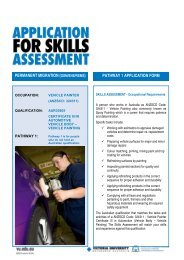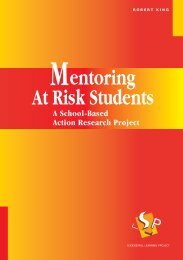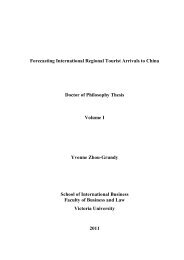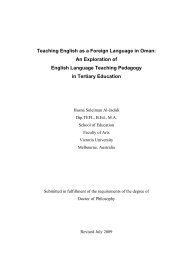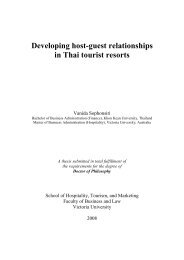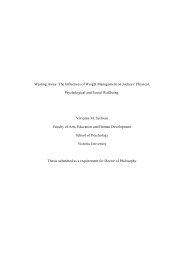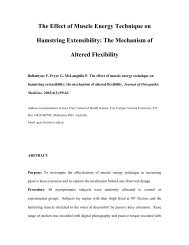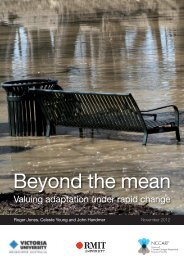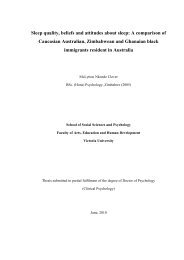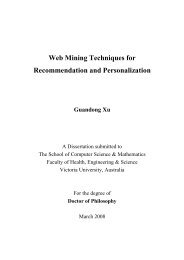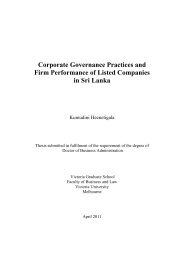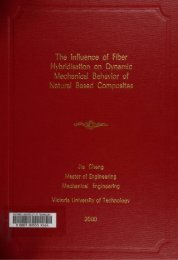machinery, are also susceptible to large-scale disadvantage. And many suburbs of Melbourne,settled when assured livelihoods were locally available in large manufacturing, or smallbusinesses, have felt the chill winds of recession <strong>and</strong> long term unemployment <strong>for</strong> all agegroups.Thus, in these ‘new times’, it may very well be the case that new sorts of workers <strong>and</strong> newsorts of schools are necessitated. An example of the re-thinking that needs to occur in classroomsacross the country is shown in current research on schooling <strong>and</strong> workplace learning.Re-Thinking LearningCumming <strong>and</strong> Carbines (1997), in a report on schools’ involvement in workplacelearning, detail six case studies - all non-<strong>Victoria</strong>n - where schools have challengedthe dominance of the traditional academic orientation in their structures,administration, teaching <strong>and</strong> assessment <strong>and</strong> then in the codification of student achievement.They discuss ‘creative tensions <strong>and</strong> unresolved problems’, as follows (pp21-22):The implementation <strong>and</strong> expansion of workplace learning resulted in various tensionswithin each of the case study schools. A common problem was the school’s ability tomaintain an appropriate balance between general <strong>and</strong> vocational education. Havingdevoted so much time, energy <strong>and</strong> resourcing to achieve a convergence, in many casesthey became victims of their own success. The more their reputation grew..., the greaterwas the level of dem<strong>and</strong>...Yet Cumming <strong>and</strong> Carbines make some comments on teacher culture, in the light of thisdem<strong>and</strong>:A common statement from teachers in traditional subject areas...was that, while theyregarded the broadening of vocational options as desirable, it was invariably at theirexpense...the pendulum had swung too far <strong>for</strong> their liking towards an instrumentalapproach to education.Instrumentalism notwithst<strong>and</strong>ing, students reported that their work placements had shownthem a different, <strong>and</strong> more preferable, learning style, <strong>and</strong> they were able to define this asarising in experiences such as...being given responsibility, working on ‘real’ problems, being allocated varied tasks,being treated as adults, having a chance to show initiative/take risks...<strong>and</strong> that back at school, learning reverted to boredom, provoked by...being talked <strong>and</strong> directed, working from work sheets or the board, doing the samethings over <strong>and</strong> over again, being treated like little children, <strong>and</strong> having to con<strong>for</strong>m <strong>and</strong>to mask any <strong>for</strong>m of difference from other students.It is clear that workplace learning confronts much of the traditional school <strong>and</strong> teacher culture.But it also confronts much of the traditional technical <strong>and</strong> further education culture. In somerecent research on teaching <strong>and</strong> learning <strong>for</strong> disadvantaged groups in vocational contexts,Anderson et al. (1997), drawing on the work of Misko (1994), state23
Individuals appear to per<strong>for</strong>m better when they are taught by teachers who share similarlearning approaches <strong>and</strong> they do better in tests which match their ways of perceivingreality…There is some evidence to suggest that learning outcomes are more successfulwhen delivery of instruction matches student learning styles…There is some anecdotal evidence that some TAFE teachers hold firm beliefs, based ontheir teaching experience, <strong>and</strong> rein<strong>for</strong>ced by their peers, about how vocational knowledge<strong>and</strong> skills can best be imparted to students….The role of the teachers in constructing theculture of the classroom <strong>and</strong> responding to the cultural backgrounds of the learners isincreasingly being seen as important in underst<strong>and</strong>ing teaching <strong>and</strong> learning processes.(1997:3)Even allowing <strong>for</strong> the behaviourist tone of this analysis (‘per<strong>for</strong>ming’ ‘delivery of instruction’),the main point is clear. Learning is an easier achievement where congruence between learners’experiences <strong>and</strong> teachers’ expectations is apparent. Tracking this through many types ofeducational provision has been a major <strong>and</strong> abiding research enterprise <strong>for</strong> several decades. Inthe current policy environment, program designers need to consider differences in vocationallearning approaches, between males <strong>and</strong> females, <strong>and</strong> on an age basis:Looking at TAFE students in apprenticeships <strong>and</strong> certificate courses, Anderson et al.report (1997:2) that ‘reading is not the preferred learning mode <strong>for</strong> a great many students(Misko 1994)’, yet <strong>for</strong> females ‘working with words, language <strong>and</strong> people <strong>and</strong> usingreading as a learning mode’ was a preference. Males ‘preferred to work with numbers<strong>and</strong> logic, building <strong>and</strong> repairing <strong>and</strong> designing things’. Significant differences betweenage <strong>and</strong> various learning preferences were identified:Younger students were more likely to be concerned with working in teams <strong>and</strong> gettingon with fellow students, knowing <strong>and</strong> liking the instructor, working independently <strong>and</strong>with things, viewing visual illustration <strong>and</strong> using direct experience as a mode of learning.Older students, however, were more likely to prefer logically structured <strong>and</strong> clearlyorganised course work, competition, specific in<strong>for</strong>mation about assignments <strong>and</strong> rules,authority, working with numbers <strong>and</strong> logic, working with words <strong>and</strong> language, listening,reading <strong>and</strong> [to have] above average expectations. (1997:2)Those learning preferences held by young people appear outside <strong>for</strong>mal institutional settings.Other research, this time from evidence from ‘in the wild’ - outdoor programs <strong>for</strong> youngoffenders in detention (Reddrop: 1997) - rein<strong>for</strong>ces certain desired characteristics of youngpeople’s receptivity to learning:These are, in summary, that a survival (or adventure, or experiential learning) approach increasesself-esteem by teaching youth how to discover behavioural alternatives; by providing immediatesuccess; by setting their own goals; by working with a small group (respect, cooperation); by‘stretching’ potential; by resolving stress appropriately; by applying skills in a simplifiedenvironment; by rule-following which is practical (safety); <strong>and</strong> by requiring honest, directcommunication. (19, 24)This project is about young people, <strong>and</strong> connects with their alienation from traditional schooling,<strong>and</strong> traditional learning, <strong>and</strong> teaching, approaches. We may have to look far beyond thetraditional settings to find learning preferences - but then, many of the young people who may24
- Page 2 and 3: Providing Education and Trainingfor
- Page 4 and 5: ForewordThe Commonwealth Government
- Page 6 and 7: ContentsForeword 3Acknowledgments 4
- Page 8 and 9: Executive SummarySuccessful learnin
- Page 10: program leaders (at least) to meet
- Page 13 and 14: The major outcome sought from this
- Page 15 and 16: Data was entered in categories unde
- Page 17 and 18: 2Literature ReviewBenchmark 1995Sub
- Page 19 and 20: It is likely that a significant gro
- Page 21 and 22: Indeed, these ‘messages’ have b
- Page 23: In this we look at labour market sk
- Page 27 and 28: The research literature on ‘alien
- Page 29 and 30: ConclusionPathways are notoriously
- Page 31 and 32: 3Mapping the FieldThe Stage 1 inter
- Page 33 and 34: Wilderness Enhancement Program, ATL
- Page 35 and 36: them from progressing or even parti
- Page 37 and 38: 4Program ModelsAnumber of the 19 pr
- Page 39 and 40: 3. All students are case managed.4.
- Page 41 and 42: (i) accommodating student diversity
- Page 43 and 44: Teachers involved in the course hav
- Page 45 and 46: There are VET subjects, of which th
- Page 47 and 48: This approach helps the transition
- Page 49 and 50: Young people are referred to the pr
- Page 51 and 52: to become contributing members of t
- Page 53 and 54: Rules are negotiated with the young
- Page 55 and 56: 5Characteristics of Programs That W
- Page 57 and 58: The review processes that already e
- Page 59 and 60: attitude to learning and enhanced s
- Page 61 and 62: 6Conclusion and RecommendationsMr G
- Page 63 and 64: 2.4 That program activities include
- Page 65 and 66: ReferencesACFE Board (1998) Young a
- Page 67 and 68: Withers, G. and Batten, M. (1995) P
- Page 69 and 70: Successful learning projectsDraft o
- Page 71 and 72: Successful learning projects 1998Dr
- Page 73 and 74: Program and LocationTarget Group, P
- Page 75 and 76:
Program and LocationTarget Group, P
- Page 77 and 78:
Program and LocationTarget Group, P
- Page 79 and 80:
Program and LocationTarget Group, P
- Page 81 and 82:
Program and LocationTarget Group, P
- Page 83 and 84:
Program and LocationTarget Group, P
- Page 85 and 86:
Program and LocationTarget Group, P
- Page 87 and 88:
Program and LocationTarget Group, P
- Page 89 and 90:
Program and LocationTarget Group, P
- Page 91 and 92:
Program and Location- Certificate i
- Page 93 and 94:
Program and LocationTarget Group, P
- Page 95 and 96:
Program and LocationTarget Group, P
- Page 97 and 98:
Program and LocationTarget Group, P
- Page 99 and 100:
Program and LocationTarget Group, P
- Page 101 and 102:
Program and LocationTarget Group, P
- Page 103 and 104:
Program and LocationCambodian Youth
- Page 105:
APPENDIX IIICURRICULUM OUTLINE FOR



